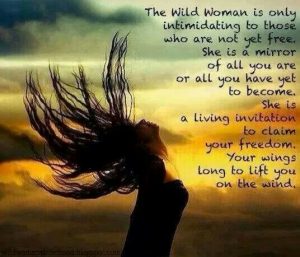In writing a paper with a colleague who has strong views on economic and social issues but not about ecology and patriarchy, I wrote this message to him: “This is an old debate between us, and I am happy for it to continue. But in my view the idea of human potential and social power that really energises your imaginary is only possible when humans reconnect to all life. We agree on one thing strongly: the crisis is a crisis of perception which, in turn, is rooted in human consciousness. We agree that human potential is an untapped resource that could transform the world. However, in my view there are two preconditions for this to happen: we as humans need to reconnect to nature, and we have to free ourselves from patriarchy. Both go back to the witchburnings which was the final assault by the church on a very very long history of balance between the feminine and masculine principle, with women celebrated as the origin of fertility across many cultures. The witchburnings broke the power of women in society, and established the male principle of control over the feminine principle of care. This, in turn, made it possible to define bodies and nature as objects to be controlled by men endorsed by the church. Without this, the industrial revolution would not have been possible, albeit some time later. The industrial revolution was premised on the violent disconnect from nature – the enclosure movements, colonialism as outright robbery of the land from the local people, destruction of 50% of the forests that existed at the start of the agricultural revolution, pollution of the atmosphere to the point that it is causing destructive warming. Hillman correctly argues that until we learn to see nature as beautiful, we will never fall in love with it enough to protect it. We see it as an object, much like women’s bodies are still depicted as objects. Deep ecology is about re-establishing a spiritual connection to nature as a means of liberating our true human potential. Your emphasis on human potential and social power is spot on, but without reconnecting to all life forms – both human and non-human – that potential cannot be fully unleashed. We cannot realise our potential if all around us there is genocidal destruction of non-human life on a scale not seen for hundreds of millennia. Scientists talk about the 6th great extinction, which could very well include us within the next 5 decades if this continues. This affects us deeply at a pychic level, and systematically subverts and destroys our humanity. We recover our humanity when we reconnect to nature and transcend patriarchy: both are about re-enchanting the world of inter-subjectivity where nothing is an object (not nature, not women’s bodies, not the bodies of labour) and everything is a subject. That is where the bulk of natural science has ended up, and it is where social science needs to end up. But alas, I still have not effectively articulated what I want to say about the relationship between reconnecting to nature and the realisation of human potential. I think, to put it bluntly, what kills human potential is the way knowledge legitimises turning certain humans and nature into objects which, in turn, is necessary to justify control of them. I live in a racist society – black bodies are assumed to be objects, and therefore many assume (and not just white people) that black people are not really people. This is patently wrong and objectionable. But the same applies to women’s bodies – not objects of labour like black bodies, but sexual objects. And so women, like black people, feel dehumanised in our society. Same with nature: we have a body of so-called scientific knowledge that defined nature as objects to be studied – as Francis Bacon described scientific experimentation it was, in his words, about ‘torturing her secrets out of her’ – he was a supporter of witch burning, and regarded nature as a women, and scientific experimentation as akin to torture, which he regarded as a good thing. Herein lies the origin of seeing nature as object, so it can be controlled and exploited, not appreciated and loved as something beautiful. Human potential is profoundly about recognising that I cannot be controlled and conditioned because I am not an object. I am a subject, and therefore author of my destiny. But this applies to me, to women, to black people, and to nature – all life! I can only celebrate and realise my own human potential and realize all my subjective powers if I accept I am part of a much wider web of life where NOTHING is an object – the web of life is a community of interconnected subjects whose existence is profoundly relational. That feels a bit better – I think I have said what I wanted to say.
Recent Posts
- Financing Just Transitions at global, regional and national levels
- Keynote address to International Sustainability Transitions Conference, Utrecht, August 2023
- Talk to PURCO Conference on role of Universities in the polycrisis, October 2023
- Talk at Finance in Common Summit in Cartagena, Colombia, September 2023
- Talk at UNCTAD meeting in Geneva, 31 October 2023, on green industrial transformation in Africa
Recent Comments
- salim on Can economic policy escape state capture?
- Salim on Reflections on Experimentation, Futuring and Incrementalism, with special reference to the African context
- Political obstacles to a mass renewable energy programme - Mark Swilling on Global trends, SA context – the centrality of the global renewable energy revolution
- Carola Meyer on Renewables, oil peak and the crisis of banking
- Muntu Dosi on Weight of Cities, Experimentation and Transdisciplinarity


Perhaps a strengthened, balanced and respectable focus on Biomimicry, Mark?
Thank you Mark.
I would love to hear his opinion on human potential and social power, without that no connection to nature, or anything else, is possible and just becomes intellectual diatribe.